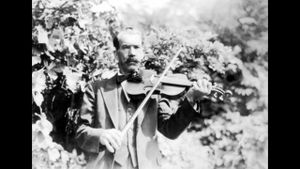Annotation:Green River: Difference between revisions
No edit summary |
No edit summary |
||
| (4 intermediate revisions by 2 users not shown) | |||
| Line 1: | Line 1: | ||
---------- | |||
{{TuneAnnotation | |||
|f_tune_annotation_title= https://tunearch.org/wiki/Annotation:Green_River> | |||
|f_annotation=[[File:OseyHelton2.jpg|right|300px|thumb|Osey Helton]]'''GREEN RIVER'''. American, Reel (cut/irregular time). G Major. Standard tuning (fiddle). AB. The reel was commercially recorded by fiddler Osey (pronounced "Ozzie") Helton (1879-1942) for Broadway Records in 1924. Osey and his brother Ernest Helton were part Cherokee and lived in Cherokee County, western North Carolina. Osey died in Jackson County during the World War II years, while Ernest went west to work in a shipyard in Portland, Oregon, although he died in Baltimore, Md., in 1979. Eighteen years after Osey recorded his 78 RPM record "Green River" was captured by folklorist Artus Moser on a field recording trip to western North Carolina for the Library of Congress. He recorded a number of tunes in Swannanoa from fiddler Marcus Martin (1881-1974), who was originally from Macon County, N.C.). Martin and the Helton brothers knew each other and occasionally played together, and they (along with Bill Hensley) were influence by an older fiddler, J.D. Harris (b. 1868) who had moved to the are from Flag Point, Tennessee. | |||
---- | |||
---- | |||
<br> | <br> | ||
<br> | |||
According to western North Carolina fiddler Bill Hensley (1873-1960), the fiddle tune "Green River" originated with a man named Hugh Bell, who was alive and fiddling during the American Civil War, but "who went crazy in jail playing his fiddle"<ref>David Parker Bennett's 1940 dissertation "A Study in Fiddle Tunes from Western North Carolina" [https://scholarworks.moreheadstate.edu/cgi/viewcontent.cgi?article=1789&context=msu_theses_dissertation]</ref>. Hensley told one interviewer that Hugh and his brother "came over from England" and that they were both fiddle makers. Hensley also attributed the tune "[[Georgia Belle]]" to Hugh. | |||
<br> | <br> | ||
<br> | <br> | ||
The Green River begins in the Blue Ridge mountains and flows through the forested Blue Ridge escarpment south of Asheville, into the Piedmont. Much of its water comes from its confluence with the Big Hungry Creek, and the Green River itself is a tributary of the Broad River. The river does appear green in color (except after a heavy rain, when it is brown). | The Green River begins in the Blue Ridge mountains and flows through the forested Blue Ridge escarpment south of Asheville, into the Piedmont. Much of its water comes from its confluence with the Big Hungry Creek, and the Green River itself is a tributary of the Broad River. The river does appear green in color (except after a heavy rain, when it is brown). | ||
|f_source_for_notated_version= | |||
|f_printed_sources= | |||
|f_recorded_sources=Broadway 5123 (78 RPM), Osey Helton (1924. Backed with "Rocky Road to Dublin"). County 2730, Rafe Stefanini - "Glory on the Big String." Library of Congress AFS 07891 A, Marcus Martin (1942). Yazoo 2202, Osey Helton - "The Stuff that Dreams are made of" (2006). | |||
|f_see_also_listing=Hear Marcus Martin's 1942 field recoding by folklorist Artus Moser at Slippery Hill [https://www.slippery-hill.com/recording/green-river-0]<br> | |||
Hear Marcus Martin's 1942 field recoding by folklorist Artus Moser at Slippery Hill [https://www.slippery-hill.com/recording/green-river-0]<br> | |||
Hear Osey Helton's 1924 recording at youtube.com [https://www.youtube.com/watch?v=cDs9qWYX288] [https://www.youtube.com/watch?v=5vcvexv28VA] and at Soundcloud [https://soundcloud.com/oseyhelton].<br> | Hear Osey Helton's 1924 recording at youtube.com [https://www.youtube.com/watch?v=cDs9qWYX288] [https://www.youtube.com/watch?v=5vcvexv28VA] and at Soundcloud [https://soundcloud.com/oseyhelton].<br> | ||
}} | |||
------------- | |||
---- | |||
Latest revision as of 22:38, 9 November 2021
X:1 T:Green River S:Osey Helton (1879-1942, Cherokee County, N.C.) M:C| L:1/8 R:Reel D:Broadway 5123 (78 RPM), Osey Helton (1924) F:https://www.slippery-hill.com/recording/green-river Z:Transcribed by Andrew Kuntz K:G AGE|DEGB AG[GB]G|DEGA BABd|ed/d/ [d2g2] gagd| e2d2B2G2|AGGE DEGB|[M:2/4]AG A/G/E |[M:C|]G2[G_B]-[G=B]- [GB]:|| gbag egde|[M:5/4]ga b6zg-|[M:C|]g3a ba (b/a/g) |egde gedB|AB G2[G,4D4]| gbag egde|[M:5/4]ga b6zg-|[M:C|]g3a ba (b/a/g) |egde gedB|[M:3/4]AB G2|| g2-|[M:C|]gagd e2d2|B2G2 AGEG|DEGB AGEG|BABd ed/d/ [d2g2]| gagd e2d2|B2G2 AGGE|DEGB AG A/G/E|(G2[G2B2])- [GB]||

According to western North Carolina fiddler Bill Hensley (1873-1960), the fiddle tune "Green River" originated with a man named Hugh Bell, who was alive and fiddling during the American Civil War, but "who went crazy in jail playing his fiddle"[1]. Hensley told one interviewer that Hugh and his brother "came over from England" and that they were both fiddle makers. Hensley also attributed the tune "Georgia Belle" to Hugh.
The Green River begins in the Blue Ridge mountains and flows through the forested Blue Ridge escarpment south of Asheville, into the Piedmont. Much of its water comes from its confluence with the Big Hungry Creek, and the Green River itself is a tributary of the Broad River. The river does appear green in color (except after a heavy rain, when it is brown).

